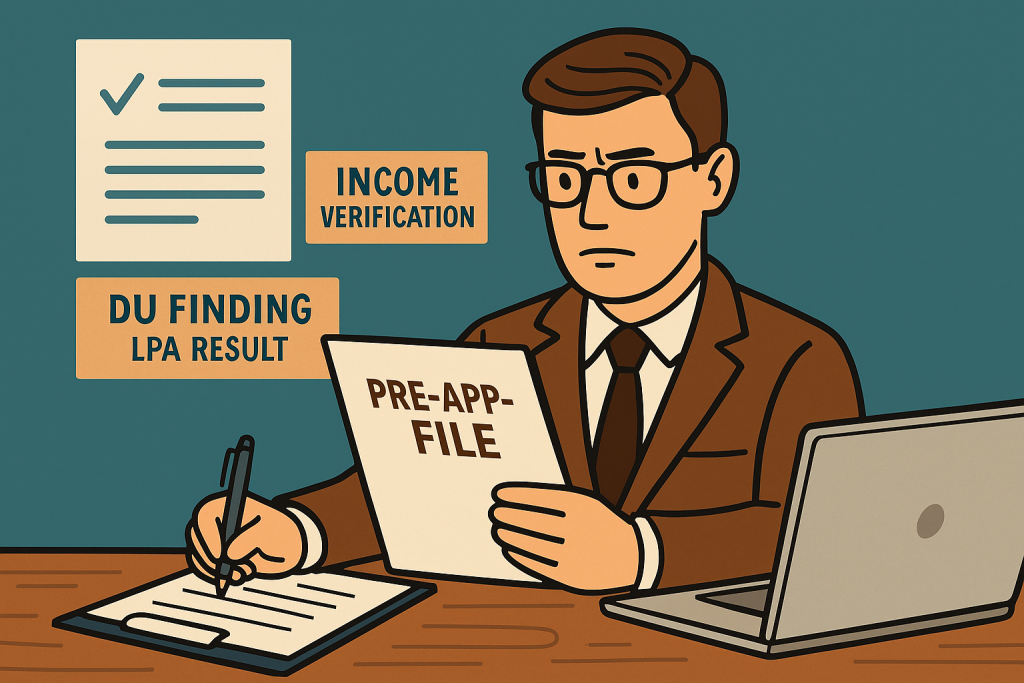Real estate agents see pre-approval letters every day, but not all pre-approvals are created equal.
Knowing the questions to ask a lender about a pre-approval can make or break your client’s deal.
Some letters collapse once underwriting begins, while others hold up because the lender did the hard work up front.
Here are the seven questions (plus three bonus ones) that help you tell the difference between a strong buyer and a risky one.
Top Questions to Ask a Lender About a Pre-Approval
1. When were the most recent paystubs and bank statements collected?
If it’s been more than 30 days, things may have changed.
Why it matters: You’re confirming that the buyer’s job and funds haven’t shifted.
Red flag: “Our documents are over a month old.”
2. Has an underwriter reviewed income if the buyer is self-employed or has variable pay?
Commission, bonus, and self-employment income can change everything.
Why it matters: An early underwriter review prevents surprises later.
Red flag: “We just went off what they told us.”
3. Have funds for down payment and closing been verified and sourced—including large deposits?
If not, why not? Are there reserve requirements, and does the buyer meet them?
Why it matters: Just because the money shows up on a statement doesn’t mean it’s usable. The lender must verify where it came from and ensure it’s seasoned.
Red flag: “We’re relying on what the buyer said they have.”
4. Have you run AUS for this property, including taxes, insurance, and HOA dues? Did it generate an appraisal waiver?
Automated Underwriting Systems (AUS) like Fannie Mae’s DU or Freddie Mac’s LP confirm whether a file truly qualifies.
Why it matters: Running AUS with the actual property confirms the approval fits and whether an appraisal waiver applies.
Red flag: The lender letter is dated or AUS hasn’t been rerun.

5. Payment & Cash to Close — Have those numbers been reviewed with the buyer?
Why it matters: Buyers who haven’t seen their full payment breakdown may back out later.
Red flag: “We haven’t discussed total payment or funds to close yet.”
6. What additional documentation is needed before the file can enter underwriting?
Why it matters: An incomplete pre-approval is just a pre-qualification. You want to know if it’s ready to move forward.
Red flag: “We’re still waiting on income or asset documents.”
7. Are there any factors that could delay or stop this loan from closing?
Why it matters: Lenders often know where the weak points are—this question brings them to light.
Red flag: Vague, hesitant answers.

Bonus Questions to Ask a Lender About a Pre-Approval
8. How recent is the credit pull?
Why it matters: Credit reports expire. A new pull could reveal debt or score changes that affect the loan.
Red flag: “It’s more than 60 days old.”
9. What dollar amounts for property taxes, insurance, and HOA dues were used?
Why it matters: Low estimates can disqualify a buyer if actual costs are higher.
Red flag: “We just estimated” or “We didn’t include HOA.”
10. Is there anything unique about this loan or borrower I should know?
Why it matters: Gift funds, trust ownership, or condo rules can cause delays. Ask early.
Red flag: Surprises that appear after the offer is accepted.
Why These Questions to Ask a Lender About a Pre-Approval Matter
Asking the right questions to ask a lender about a pre-approval protects both you and your clients.
You don’t need to know every mortgage guideline—you just need to ask questions that uncover risk and confirm readiness.
These conversations help you identify serious buyers, avoid preventable delays, and close confidently with the right partners.
Next Steps for Agents
Agents who work with condos or HOAs should also review my post on evaluating HOA and condominium reverse mortgages. It explains how lenders assess insurance coverage, pending litigation, and reserve funds — details that can make or break a loan approval.
For a deeper understanding of automated underwriting systems (AUS), see Fannie Mae’s official DU guide. It explains how Desktop Underwriter (DU) and Loan Product Advisor (LPA) evaluate borrower data, assets, and property information to determine loan eligibility.
Watch: Questions to Ask a Lender About a Pre-Approval


